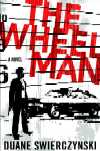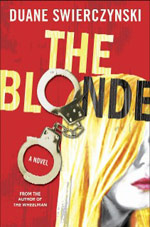- Welcome
- Noir Zine
- Allan Guthrie
- Books
"...those who enjoy the darker side of the genre are in for some serious thrills with this..."
Laura Wilson, The Guardian

Published in the UK by Polygon (March 19th, '09) and in the US by Houghton Mifflin Harcourt (Nov '09).
Duane Swierczynski
interview by Allan Guthrie
 Duane 'Leblanc' Swierczynski's first novel Secret Dead Men introduced us to Del Farmer, a PI who collects the souls of the recently departed and stores them in a hotel in his brain. Um, yeah. That's right. Swierczynski's follow-up, The Wheelman, centres on the aftermath of a bungled bank heist. Lennon, the eponymous getaway driver, leads us through more twists and turns than a homing pigeon with Alzheimer's.
Duane 'Leblanc' Swierczynski's first novel Secret Dead Men introduced us to Del Farmer, a PI who collects the souls of the recently departed and stores them in a hotel in his brain. Um, yeah. That's right. Swierczynski's follow-up, The Wheelman, centres on the aftermath of a bungled bank heist. Lennon, the eponymous getaway driver, leads us through more twists and turns than a homing pigeon with Alzheimer's.
Allan 'Sunshine' Guthrie talked to crime fiction's most imaginative writer.
Allan Guthrie: When you were five, what did you want to be when you grew up?
Duane Swierczynski: Spider-Man. I was a huge fan of the cartoon series on TV, which was originally broadcast in the late 1960s. Very trippy stuff. I'm not sure if it was an artistic or cost-cutting move, but whenever Spidey would swing through the city, the background would be a bright purple, or pink, or aquamarine, or some other kind of hippie-friendly color.
Of course, I did cheat on Spidey, and for a time, I wanted to be Ultraman. You know—the live-action Japanese series about a nebbishy guy who had this capsule that could transform him into a giant, silver-foil-looking asskicker? Only later did I realize that the capsule looked like a marital aid.
AG: And when you were fifteen?
DS: Clive Barker. I remember this vividly. I heard people raving about HELLRAISER, and even before I saw it, the concept blew me away. (A love story about a guy ripped apart by hooks? Sold.) Not long after, I saw a copy of IN THE FLESH at a Waldenbooks, and there was a blurb from Stephen King that read: "I have seen the future of horror, and his name is Clive Barker." King wasn't screwing around. That collection of short stories was a watershed moment for me; suddenly, the possibilities of telling stories seemed wide open.
Thus began my serious horror phase... and that's pretty much what I wrote throughout my teenage years and early adulthood.
AG: What about now?
DS: I still think being Spider-Man would be neat.
 AG: SECRET DEAD MEN is set in the 70s. When did you first decide you wanted to write historical fiction and what kind of research did you do?
AG: SECRET DEAD MEN is set in the 70s. When did you first decide you wanted to write historical fiction and what kind of research did you do?
DS: The 1970s have a hazy kind of magic for me. Many of my first memories of trying to figure out the world take place in the '70s. For instance, I have a memory of walking by someone's in-ground pool with my father. I was three or four years old. I must have teetered too close to the edge, because my father tapped me on the shoulder and said, "Don't fall in there. If you do, there will be no more Duane."
No more Duane. Instantly, it clicked. I knew what death was.
That was the 1970s for me. Groovy, eh?
As for research, I used two memory triggers: a collection of family photos, which my father had recently scanned and burned to a bunch of CDs. (On the PointBlank website, there's a photo of me doing homework; this is from that series.) But I also bought a 7-CD box set called "Have a Nice Day!" which is full of wonderful and weird and truly awful '70s music. I played this stuff constantly as I wrote the book, and it really helped bring back a lot. Especially "Afternoon Delight." I always thought that was about the space program.
AG: The Brain Hotel is an original concept. Original concepts aren't supposed to exist any more. You impress me.
DS: Would it surprise you to learn that it started out as a plot contrivance? I may have mentioned this before, but the basic murder mystery plot in SDM was lifted from a failed screenplay. When I started turning it into a novel, I realized that I needed a character who had certain abilities, and things just kind of ballooned from there.
The only reason it works (if it does) is because I was too naive to realize that the idea shouldn't work. Does that make sense?
AG: If you were comparing SDM with other similar books/writers for the sake of someone who hadn't read it but was otherwise widely read, which writers/books would you mention to whet this reader-to-be's appetite?
DS: When I was writing SDM, I was reading a lot of SF as well as mystery. My favorites included Robert Sheckley (especially IMMORTALITY, INC.), Jonathan Lethem, Rudy Rucker (SOFTWARE), Haruki Murakami (HARDBOILED WONDERLAND), William Tenn, Harlan Ellison, Alfred Bester (especially THE DEMOLISHED MAN), and of course, Philip K. Dick (UBIK). Mix some of this stuff with a couple of Jim Thompson novels, and you get the idea of what I was going for with SDM. Kinda.
AG: You mentioned writing throughout your teens. Did you write for your enjoyment, to impress a girl (or boy), to get published?
DS: All three, actually. At first, I wrote to amuse myself. Then I eventually worked up the courage to show my twisted little horror stories to my friends, who were enthusiastic about them. (Then again, I would routinely feature them as the protagonists, so what was not to love, right?)
That all changed the night of December 26, 1987. My friend Greg's birthday was the next day, and since I was stone broke, I decided to write him a story. I got through 1,000 words of an awful thing called "Instrumental in Murder" about a possessed clarinet (told you! awful...) before I chucked it aside and started fresh. It was after 10 p.m. when I typed the words: "The three of them were taken early in the year." And that became this 7,000-word opus about Satanic killer teens called "The Posers." It was my first real story: beginning, middle, end, real emotion and guts, the whole nine. I printed it out, and practically forced my pal to read it the next night.
When he got to my surprise ending, and let out a cry of shock, I was hooked. That's what I wanted to do more than anything else. Provoke that reaction in readers.
Next came a novella called "Caroline," which I wrote for my first girlfriend. It was about a girl who was killed on her prom night by a drunk driver, and whose ghost wandered the streets of Philadelphia, much to the dismay of her boyfriend, who learns this 17 years after the fact. This probably creeped my girlfriend out (sorry, Trish), but it did receive some nice comments from some English teachers at my high school.
Soon after, I started exploring the world of small horror magazines, and began writing stories with the goal of getting published. I placed a few things in small press magazines. My first sale was a story called "Shed Led" about a writer who dies and goes to Hell and ends up possessing a pencil (big on Satanic possession, wasn't I?) that ended up in a horror convention magazine. A story called "Best Friends" about suicidal teenagers found a home in Bob Madia's TENSE MOMENTS. And even "The Posers" was slated to run in a chapbook series called "Nocturnal Classics," but the operation folded before it saw the light of day.
AG: You said in response to the premise of the Brain Hotel: "The only reason it works (if it does) is because I was too naive to realize that the idea shouldn't work." The implication being that you've wised up since then. Does that imply that there's a danger that greater wisdom/experience/craft knowledge can inadvertently create a kind of creative straightjacket?
DS: I think overconfidence can be the enemy of creativity. It's the same in writing as it is in real life. You see an obstacle, you don't know how the fuck you're ever going to get around it, so you improvise. Often, the results are very interesting. Novelists should never be in a complete comfort zone. This is why I wear thongs made of coarse fabric.
AG: Who's your ideal reader?
DS: My eighth grade teacher. A nun, to be specific.
Every week, Sister Marianne would give out 15 spelling words and tell us to use them in sentences. That seemed lame, so instead I used them in short horror stories, inspired by the Friday the 13th flicks, and soaked in a ridiculous amount of gore. Not only did Sister not flunk me, but she encouraged me to write more. After two months, I had an eight-part serial killer series, and at the end of the final story, I included a quiz for the reader (i.e., Sister Marianne). The gist of it was: "Should the axe-murdering protagonist escape to lead a happy life, keep on slaying, or kill himself." Sister Marianne chose option "C."
I figured if I could get that kind of reaction out of a Catholic nun, I could pretty much entertain anybody.
So there it is: I write with Catholic nuns in mind.
 AG: THE WHEELMAN was snapped up by St Martin's within a couple of weeks of the manuscript going out, and the film rights were optioned pre-publication. This is a tough question for an author to answer, which is why I'm asking it: What do you think gives the book it's instant yet enduring appeal? Heh, heh.
AG: THE WHEELMAN was snapped up by St Martin's within a couple of weeks of the manuscript going out, and the film rights were optioned pre-publication. This is a tough question for an author to answer, which is why I'm asking it: What do you think gives the book it's instant yet enduring appeal? Heh, heh.
DS: To be perfectly honest, if THE WHEELMAN has any kind of appeal, it's because it's a bit relentless. The mini-chapters are short by design, meant to be consumed like potato chips. I hate when I'm up late, digging a novel, but see that the current chapter goes on for 30 more pages. It's like.... fuuuuuck. So I made everything really short, hoping to trick a reader into thinking: okay, just another page. Okay, another. Okay, just one more... And then it's 4 a.m.
AG: Readers love surprises, and THE WHEELMAN has some absolute beauties. How the fuck did you pull them off?
By hiding the story from myself. I didn't outline with THE WHEELMAN, which meant that I was more or less transcribing the adventures of Lennon and the gang as they unfolded. Eighty percent of the surprises caught me by surprise.
For the other 20 percent, it's the old trick of withholding information. You give the reader everything they need to know... but what they may not know is how it all adds up. I think that's kind of neat.
Some of my favorite "surprise" books include INTERFACE, by Joe Gores, and A KISS BEFORE DYING, by Ira Levin. Now there's some masterful sleight of hand. With the Levin book, you've got the big shockeroo right in the middle of the damned book.
AG: Why is Lennon Irish and not Scottish?
DS: A mute Scot is nowhere near as funny as a mute Irishman.
AG: Which book not written by you, do you most wish you'd written?
DS: Another tough question. But the book that pops into my head is SHUTTER ISLAND, by Dennis Lehane. It's a beaut. You want to talk surprises? That's the book to beat. Beyond that, it's a page-turner, yet rich in detail and character and pain. I loved every page.
But I'm going to cheat and also say WHITE JAZZ, because Ellroy created an entirely new noir language with that one. Don't remember a damned bit of it, plot-wise... but I can still hear his mad, true-crime beatnik poetry in my head.
AG: Any other heist novels you'd care to recommend?
DS: You mean besides TWO-WAY SPLIT? Folks, read TWO-WAY SPLIT. Like, now. You'll never think about the expression "going postal" the same way.
Beyond that, I heartily recommend any of the Parker novels. All of them. My favorites include THE JUGGER (probably because everyone else, including Richard Stark, hates it), THE SCORE, SLAYGROUND, PLUNDER SQUAD, BUTCHER'S MOON and LEMONS NEVER LIE, which will be reprinted by Hard Case Crime in a few months.
Dan J. Marlowe is right up there, too. THE NAME OF THE GAME IS DEATH and ONE ENDLESS HOUR are the Godfather I & II of bank robbery novels. I think Lionel White's another forgotten master of the heist novel; check out STEAL BIG and tell me I'm wrong.
If you like the funnybooks, you've got to check out THE LAST OF THE INDEPENDENTS, a graphic novel by Matt Fraction. It's like a Jack Palance movie they never got around to making. And Brian Keene's TERMINAL was a refreshing shot in the arm from a twisted mind best known for his zombie novels THE RISING and CITY OF THE DEAD.
I'm probably forgetting a bunch, and I'll instantly remember a half-dozen by the time you ask the next question.
AG: What impact has your non-fiction writing had on your novels (if any)?
DS: I've been lucky in that the non-fiction stuff has directly fueled the fiction. For instance, I don't think I would have written THE WHEELMAN if I hadn't spent half a year researching bank robbery for THIS HERE'S A STICK-UP. So much of the novel sprang directly from STICK-UP, it's not even funny.
Plus, I think toiling in the fields of non-fiction for close to fifteen years held me weed a lot of bad writing out of my system. Or at least, I don't suck as much as I did when I first started.
AG: Non-fiction is much better paid. What are your primary reasons for writing fiction?
DS: Storytelling is storytelling, whether you're telling the truth or making stuff up. The skill set is remarkably similar. But for me, the thrill of fiction is letting my imagination roam free, busted loose from the shackles of fact. Non-fiction is often about "what is." Fiction is all about "what if," and that's pretty fucking exciting.
Then again, what powers my imagination is often bits and pieces of real-life incidents that I've filed away. If fiction is Polish sausage, then non-fiction is the little bits of meat and gristle and knuckles and teeth you push into the meat grinder.
(Hope you weren't about to have breakfast.)
 AG: Can you talk about what's flowing at the moment from the Swierczynski pen?
AG: Can you talk about what's flowing at the moment from the Swierczynski pen?
DS: I'm extremely superstitious about talking about future projects. Last time I did that, some guy took my idea about shocking religious secrets hidden within the works of Da Vinci and... well, I'd prefer not to discuss it. Much too painful.
But since it's you, Sunshine, I can tell you that the next novel is tentatively titled THE BLONDE, and it's my attempt at a Cornell Woolrich-style ticking clock novel of suspense. It's much more a thriller than a crime novel, though there's plenty of crime and mayhem in it. We've got femme fatales, poison, tequila, cab drivers, strippers and a decapitated head in a gym bag. All of that fun stuff.
And while it's not a sequel to THE WHEELMAN, a minor character from that book does spin off into this one. It's part of my plan to write a non-series series, all set within a shared universe. Each book will tackle a different subgenre of mystery—the heist story, the femme fatale story, the revenge story, the private eye story, etc. I could even imagine myself writing a cat cozy. Though I'd have to call it THE PUSSY.
AG: That's one cat cozy I'd definitely read. Thanks, Leblanc. Been a pleasure.
###
Copyright © 2006 Noir Originals
